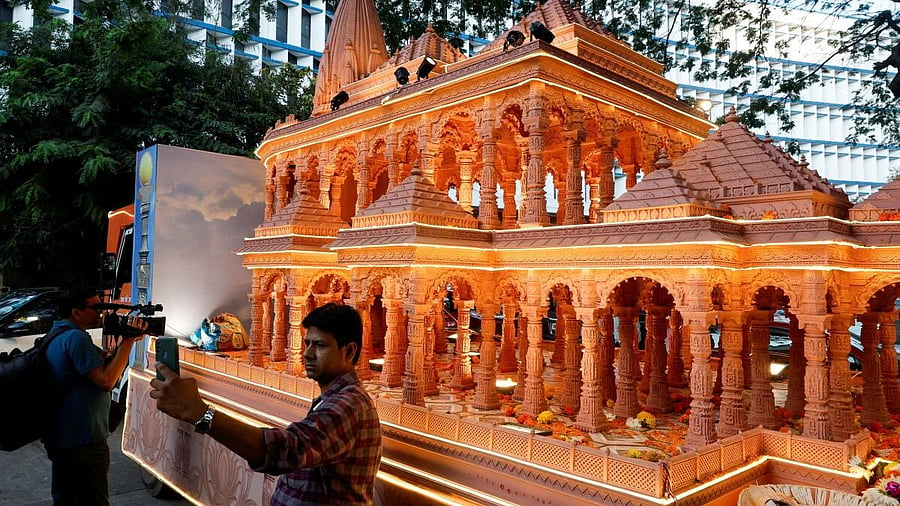
A man takes a selfie with a replica of the Ram Mandir outside the BJP headquarters in Mumbai.
Credit: Reuters Photo
Philosopher Roger Scruton reminded us of an important historical lesson: the bigot’s most dangerous opponent is never the radical, who stands squarely against him, but the reformer, who, acting always in the spirit of improvement, changes only that which he cannot find a better reason to retain. The reformer, in essence, is a conservative who retains the good and discards the bad. Today, I inquire of the conservative—not only the political conservative but the philosophical conservative residing in each of us.
Every organism has an impulse to conserve the familiar. Even at the point of death, the will to live survives, desiring its restoration. Irrespective of political affiliations, we are all conservatives in this limited sense. Like an organism, a society has personality and will. Its history, institutions, and culture form its personality, staying alive in its continuity. As organisms with conserving impulses, we must be concerned with sustaining our society’s life and personality through sickness and health, change, and decay.
Unfortunately, sickness and decay mar our political, social, and cultural discourse today. Yet, how are we not turning our eyes towards the drastic fall in the health of our society? Who could have thought, until a few years prior, that the entire apparatus of a secular state like ours would be employed in the consecration of a temple, the movement for which resulted in the loss of thousands of lives?
Religion has always been an integral part of the daily life of Hindus without ever being deeply intrusive or dismissive of other faiths. Except today. The consecration, whether celebrated or contested, marks the fall of a mosque as much as the creation of a new temple - the two are inseparable, each made the other possible.
It is not, therefore, civilization coming to life again, as some claim, but the beginning of the decay of a civilization that endured pain and suffering for years and yet stood still because at its core was a preserving current impervious to the exterior and innate to its very existence. Hindu triumphalism is not revitalising or enlightening; it is belligerent and visceral. It is resurrectionary, not conserving. The disregard for religious ceremonial observances that date back thousands of years at the consecration only serves as a small yet loud illustration of the fact that it is a political act of rupture and upheaval. It is affected not by appealing to continuity but by laying claim to severance. It is a break from the past.
Rupture and upheaval, key tools in Indian Right politics, revolt against the fundamental tenet of conservatism. Conservatism arises from the sense that one belongs to some continuing social order. In feeling this, a man stands in the flow of some shared life. Thus, the conservative attitude demands the endurance of the continuing order. Rupture and upheaval seek to jettison continuity. What remains of the common shared life of Hindus and Muslims in large parts of this country today?
The dissenting sentiment of rupture revolts against the status quo and everything that sustains it, including culture, custom, socio-political and legal orders. The founding fathers were acutely aware of this. Therefore, the struggle for freedom in India exhibited a stronger alignment with conservative than with revolutionary principles. It was led by exemplary gradualists who argued for slow political, social, and cultural change. Gandhi’s resistance against British rule remained within legal limits, never degenerating into violence, reflecting a distinctively Hindu (and anti-Hindutva, I must add) attitude that rejects the view that social activity has to be recognisably part of a single coherent plan. It was an attitude of humility towards the organic processes by which society advances, and any violent rupture of these processes was viewed with suspicion.
Contrast this with the breakneck speed at which today’s ruling elite seeks to affect change—political, social, and cultural. It highlights the disruptive impulse underlying its politics and the ideology that drives its groundwork: Hindu nationalism. The Indian Right seeks not to conserve but to resurrect a new order, removed, as far as possible, from the past. In fact, conservatism is an honorific label that should not even apply to it.
In attempting to fashion the polity and society according to its ideology, it has jettisoned the country’s Hindu and secular inheritances. Our respective religions have become subjects of mutual consternation, eroding our natural, deep-seated respect for each other. Indian Muslims, whose ancestors voted for India with their lives, are everyday suspects of treason. The state does not even attempt to appear secular, and destroying most political conventions has become transparently partial.
I ask thus: how can, then, one be conservative when there is nothing to conserve but ruins?
(The writer is a student at the National Law School of India University, Bengaluru)